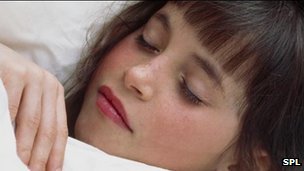Is it ADHD, or does your child have sleep apnea?
Notes from Dr. Norman BlumenstockOlder research from Children’s Hospital of Philadelphia (CHOP) confirm that there seems to a ADHD connection with obstructive sleep apnea. Not much is understood by parents about snoring or sleep apnea, especially in their children. (istockphoto.com)iStockphoto Lana B. Patitucci, D.O., Doctor of Osteopathy, Pennsylvania Snoring & Sleep InstitutePOSTED: Wednesday, May 7, 2014, 2:23 PM Not much is understood by parents about snoring or sleep apnea, especially in their children. The Stanford School of Medicine states that about 10% of children 10 years of age and younger snore and, of those children who snore, about 20% will …
How to get your kid to sleep
Notes from Dr. Norman Blumenstock: Kids can also have obstructive sleep apnea. PIPPA GARDNER FOR 7NEWS INVESTIGATIONSMarch 19, 2014, 7:39 pm Up to 30 per cent of children under the age of three will suffer some form of sleep disorder. Youngsters who do not get enough sleep can suffer from behavioural problems such mood swings and even depression. Tresillian is sleep bootcamp for tired parents and their kids. “Sleep is so important for a child’s brain development for growth, and to have good behaviour,” a sleep expert from Tresillian said. A common complaint from parents with kids who can’t sleep …
Children who snore may be at an increased risk of learning problems
October 14, 2013By Tele management (TeleManagement) Snoring is common among children, with between 3 and 12% affected by the condition. Some of these children suffer from obstructive sleep apnea – a condition where the airways become obstructed, causing the child to briefly stop breathing several times throughout the night. Experts have known for some time that obstructive sleep apnea increases the risk of learning problems and behavioral problems in children. However, it was unclear whether children who snored but did not suffer from obstructive sleep apnea were also at risk from learning problems. Researchers from the University of Louisville, US, compared …
Regular Bedtimes Tied to Better Behavior
PARENTING OCTOBER 14, 2013, 12:01 AM 25 Comments By NICHOLAS BAKALAR A regular bedtime schedule is unquestionably helpful for parents, but a new study has found it that it may be even more beneficial for their children. British researchers interviewed mothers when their children were ages 3, 5 and 7, asking how often their children had a regular bedtime: always, usually, sometimes or never. The mothers and the children’s teachers also completed questionnaires about behavioral difficulties. Almost 20 percent of 3-year-olds had no regular bedtime, compared with 9.1 percent of 5-year-olds and 8.2 percent of 7-year-olds. After controlling for many social, economic and …
Kids’ Sleep Patterns Affected by Electronic Media Time and Media Presence in the Bedroom
July 25, 2013 — Children’s sleep disruption is worse with increased time spent watching TV or playing on the computer, finds research in Biomed Central’s open access journal BMC Public Health. The greater the e-media use was at the start of the study, the shorter the sleep duration and the later the bedtime was eighteen months later. The academics suggest that where children are struggling to sleep, or are tired, their media habits should be taken into consideration. The amount of sleep children get has a direct bearing on their performance in school and their mental and physical health. Snap shot studies …
Research Looks at Tonsil Removal for Kids with Sleep Apnea
Research Looks at Tonsil Removal for Kids with Sleep Apnea Does removing the tonsils and adenoids help children with sleep apnea? A recent research showed some interesting results. Published: May. 22, 2013 Visit this link to see the video from Boston.com… http://www.boston.com/multimedia/health-video/research-looks-at-tonsil-removal-kids-wi.html …
Study on Children’s Behavior Linked to Snoring
‘Child behaviour link’ to snoring Children who snore, or who have other night-time breathing conditions, are at risk from behavioural problems, according to a study. Check out the full article here … http://www.bbc.co.uk/news/health-17237576 …







